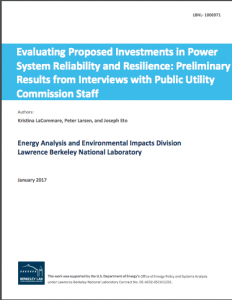Full Title: Evaluating Proposed Investments in Power System Reliability and Resilience: Preliminary Results from Interviews with Public Utility Commission Staff
Author(s): LaCommare K, Larsen P, Eto J
Publisher(s): Lawrence Berkeley National Laboratory
Publication Date: January 1, 2017
Full Text: Download Resource
Description (excerpt):
Policymakers and regulatory agencies are expressing renewed interest in the reliability and resilience of the U.S. electric power system in large part due to growing recognition of the challenges posed by climate change, extreme weather events, and other emerging threats. Unfortunately, there has been little or no consolidated information in the public domain describing how public utility/service commission (PUC) staff evaluate the economics of proposed investments in the resilience of the power system. Having more consolidated information would give policymakers a better understanding of how different state regulatory entities across the U.S. make economic decisions pertaining to reliability/resiliency. To help address this, Lawrence Berkeley National Laboratory (LBNL) was tasked by the U.S. Department of Energy Office of Energy Policy and Systems Analysis (EPSA) to conduct an initial set of interviews with PUC staff to learn more about how proposed utility investments in reliability/resilience are being evaluated from an economics perspective. LBNL conducted structured interviews in late May-early June 2016 with staff from the following PUCs: Washington D.C. (DCPSC), Florida (FPSC), and California (CPUC). Results from the interviews with PUC staff indicated the following:
- In most cases, requests for cost recovery of reliability (resiliency) investments are included as part
of the utility General Rate Case (GRC) proceedings. - Commission staffers interviewed for this study make little or no distinction in the characterization of
investments in reliability versus investments in resiliency when evaluating the economics of proposed
projects.i Recommendation: Conduct additional interviews with other regulatory commissions to better
understand what proportion of PUCs do or don’t distinguish between reliability and resiliency. - The costs of investments in reliability (resiliency) are well-understood and relatively easy to
monetize. - The benefits of these investments are generally difficult to monetize and a limited number of
categories are considered (e.g., avoided customer costs of power interruptions). Recommendation:
Conduct additional interviews with other regulatory commissions to better understand the benefits (and
costs) associated with reliability and resiliency investments. - There is a desire for improved tracking of historical utility investments in reliability/resiliency vis-à-
vis utility representations made during the rate case approval process. Recommendation: Develop and
pilot a reliability investment tracking system with one or more utilities - Commission staff indicated the need for improved interruption cost estimation, especially for residential and government customers. Recommendation: Develop and administer a national survey of customer interruption costs.
- Economic analyses of reliability/resiliency investments are important for both customers and regulated utilities, but there are other factors—including political momentum in response to power interruptions from extreme weather—that have been influential in the decision-making process. Recommendation: Conduct additional interviews with other regulatory commissions to better understand the various factors that influence decisions related to reliability/resiliency investments.
